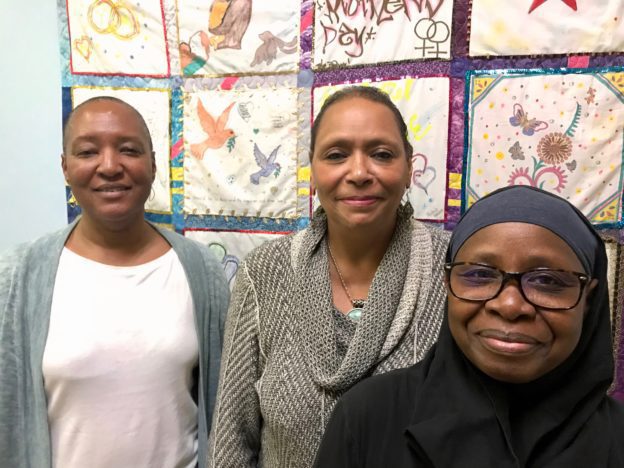News

S-CAP Comes to Rising Ground!
S-CAP, The Survivor-Centered Advocacy Project, Team Finds a New Organizational Home at Rising Ground’s STEPS to End Family Violence Program
S-CAP places criminalized survivors at the center of its advocacy work against intimate partner violence and sheds light on a ‘gender-based-violence-to-prison pipeline.’
This year, survivors of intimate partner violence are celebrating a huge victory. On May 15, 2019, Governor Andrew Cuomo signed into law the Domestic Violence Survivor Justice Act (DVSJA). This groundbreaking legislation allows New York judges in New York State to issue less punitive sentences or alternatives to incarceration to survivors of domestic violence who are convicted of crimes directly related to the abuse they experienced.
Now a team of three staff members who played an important role in the law’s passage through their work with the Coalition for Women Prisoners—Andrea B. Williams, Anisah Sabur, and Annette Warren-Dickerson—have joined Rising Ground’s STEPS to End Family Violence program to continue their advocacy efforts. They and STEPS have launched the Survivor-Centered Advocacy Project (S-CAP) to work with survivors of gender-based violence and continue to build upon the power of survivors to be formidable and effective advocates.
Anne Patterson, Senior Vice President of STEPS noted: “We collectively created S-CAP as a way of continuing to honor the legacy of STEPS founder Sister Mary Nerney, who knew that the only way to make true and lasting change to the systems that harm survivors of gender-based violence is by putting survivor wisdom at the center of all of our advocacy work.”
Criminalized survivors are often further traumatized by incarceration, with the trauma extending to the families and children they leave behind, Alan Mucatel, CEO of Rising Ground points out. “Incarceration of women breaks families apart, traumatizes children, and burdens relatives with caring for young children,” he says. “Criminalization of survivors undermines the strength of many of the families we support in our programs.”
The Gender-Based Violence-to-Prison Pipeline
The overwhelming majority of women in the criminal legal system are survivors of gender-based violence, Patterson says. Some 86 percent of incarcerated women have survived sexual violence and 77 percent have survived intimate partner violence, according to the Vera Institute of Justice. Patterson says that the link between surviving gender-based violence and incarcerated women is so strong that the field has coined the term “the gender-based violence-to-prison pipeline.”
The S-CAP team formerly staffed the Women in Prison Project (WIPP) at the Correctional Association of New York. When the Correctional Association made the strategic decision to focus solely on prison monitoring and spin off its advocacy projects, the team chose STEPS as its new organizational home. This decision was motivated by the longstanding relationship between STEPS and WIPP and the synergy between the advocacy work pioneered by WIPP and the singular work done by the STEPS Criminalized Survivors Program, the only program of its kind in New York City that is explicitly and exclusively committed to providing holistic survivor support to survivors of gender-based violence who have been criminalized for actions related to their survivorship.
S-CAP will continue to support the statewide Coalition of Women Prisoners, a volunteer group of formerly incarcerated women and their allies, which, for 10 years, relentlessly engaged in advocacy efforts to pass the Domestic Violence Survivors Justice Act. Survivors telling their stories generated much of the support for the legislation.
Achieving Change
Mucatel adds that advocacy also has a therapeutic benefit for survivors. “As survivors of intimate partner violence move forward from their traumatic experiences, they express interest in using what they have lived through to achieve social change,” he explains. “The leadership training facilitated by the S-CAP team will engage survivors in using their experiences to challenge systems that do not support strong families, such as the criminal justice and affordable housing systems.“
He continues, “By helping to make survivors stronger, we make families stronger. By making families stronger, we make communities stronger. This benefits all of us.”
